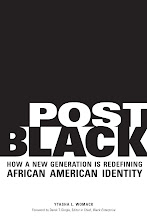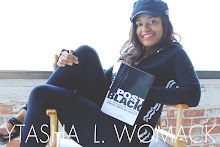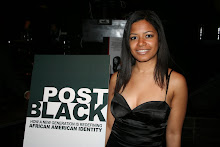Wednesday, July 14, 2010
Publicist Yolonda Brinkley Talks Film in Cannes
Yolonda Brinkley is the founder of YRB International Exposure which presented Beyond Borders, a cross cultural panel and networking forum for filmmakers, at the 63rd Cannes Film Festival last May. YRB is a marketing and public relations firm.
YLW: Why did you start the Beyond Borders at Cannes?
YB: I started it because when I attended the Cannes Film Festival in 2009 I felt like an outsider, although it was a great experience. You have to belong to a certain company to get to a lot of the functions. I saw a lot of minorities there and I could only assume they felt the way I felt. I felt there was something I could do to make it participatory so that we're not just festival goers but major players in the world festival market. Everyone thought it was a great idea. When I told them I was spending my own money . . .
YLW: You funded it yourself?
YB: Yeah. I just wanted to see if I could give it some legs. It was at the Majestic Hotel, which was only about $1,900 euro, which is about $2,500 dollars to rent the space, and have equipment. My airfare was $1,100, as was my hotel. Then I made flyers and t-shirts, so I spent about $5,000. I got about $750 in sponsorship. But it was all worth it. I got a call from the Australian press after one of the filmmakers on the panel won. I'm an up and coming entertainment publicist and people are calling me saying I heard you did this event at Cannes. That's priceless.
YLW: Who participated?
YB: The participants were film directors who took part in the Quinzaine Des Realisateurs. It's almost like the independent film leg of the festival. They find up and coming filmmakers and directors. I had two of those directors. One was Michael Rowe, he's an Australian filmmaker who lives in Mexico. Director Philippe Braganca, from Brazil, also participated. Then Michael Rowe won the Camera D'or, the golden camera award for the first time filmmaker in that section. Although there weren't a lot of people, it was a great panel. They are the crème de la crème of the elite filmmakers.
YLW: Do you speak French?
YB: Yes.
YLW: Initially, you wanted to do a panel focusing on people of color. How did that evolve?
YB: It went from a multicultural discussion to a cross cultural discussion, because I couldn't confirm ethnicity, but only nationality. I couldn't get enough blacks, Latinos and Asians from the U.S to participate. It was an interesting transition before my eyes.
YLW: What happened? Why was it difficult to get participation?
YB: It was going to be built around one of the executive producers with Tyler Perry Studios. Then he wasn't able to come out, due to scheduling. I called alI kinds of studios, production companies, organizations, but either schedules conflicted or people simply weren't coming to Cannes. Cannes is an expensive festival in terms of accommodations and travel. People aren't just going just to go. Black filmmakers, even celebrity black filmmakers aren't just going. There were a small number of emerging filmmakers of color from the U. S trying to go. To my knowledge, there wasn't a large number of established filmmakers of color there, either.
YLW: Are you familiar with the Blackhouse Foundation? They've hosted festival events in the past to address these issues.
YB: Blackhouse foundation travels to festivals, but they decided that Cannes was too expensive to attack. They go to Sundance. A lot of people feel it's too expensive. There was no black programming except Afrique 360, and the founder is a friend of mine. My goal wasn't to reinvent the wheel.
YLW: What concerns did the filmmakers on the Beyond Borders panel share?
YB: The discussion was about diversity in thought and efforts. Michael Rowe shared that when he did his film, his investors wanted to have...and this is common in Mexico in general, they wanted blond haired, blue eyed Mexicans whereas he wanted a person who looked Mexican. He had a conflict with the producers because of that. Ultimately he won out. Braganca talked about financing issues and control over your project. Each filmmaker said they would like to see more coproductions between indie filmmakers in different countries.
YLW: African American films have a history of not doing well internationally. What do you attribute that to?
YB: I'm not a filmmaker, but there are so many people at Cannes selling so many things. Often times the urban message does not transcend boundaries. With Tyler Perry or the Madea character, it doesn't transcend cultural barriers. After translation, in other parts of the world, it's not funny. If you have a broad message that's more drama or action, perhaps. But my thought process is, hey you have a film you're trying to sell, go expand the network and discuss the filmmaking opportunities.
YLW: You didn't start your career working in film.
YB: I was in a public relations and corporate communications function, for Jaguar/Landrover. I quit two years ago to pursue my dream, so this is what I'm doing.
YLW: What advice would you give to people who want to go to Cannes?
YB: I say just do it. It's definitely an experience. If we wait for people for people to give us the permission to do it, then we'll never do it. When you go, network with people outside of your traditional circle. We want to expand our multicultural, cross cultural network. Go outside of your traditional network to meet people.
For more information on Beyond Borders contact Yolonda Brinkley at Ybrinkley@hotmail.com
Labels:
Blacks in Cannes,
Cannes,
Post Black,
Yolanda Brinkley,
Ytasha L. Womack
Subscribe to:
Post Comments (Atom)




No comments:
Post a Comment